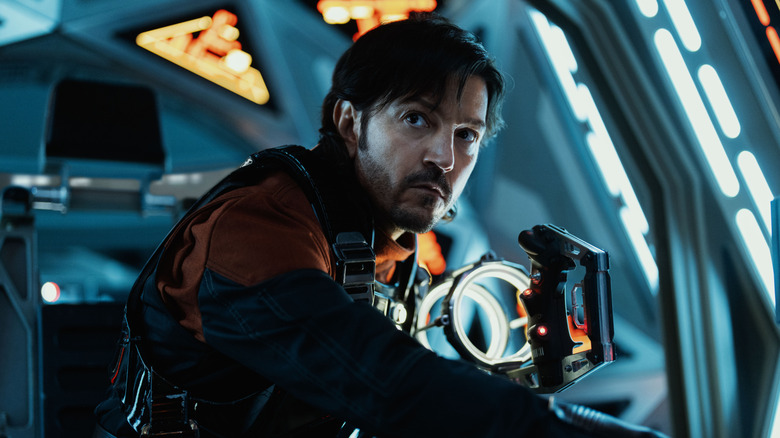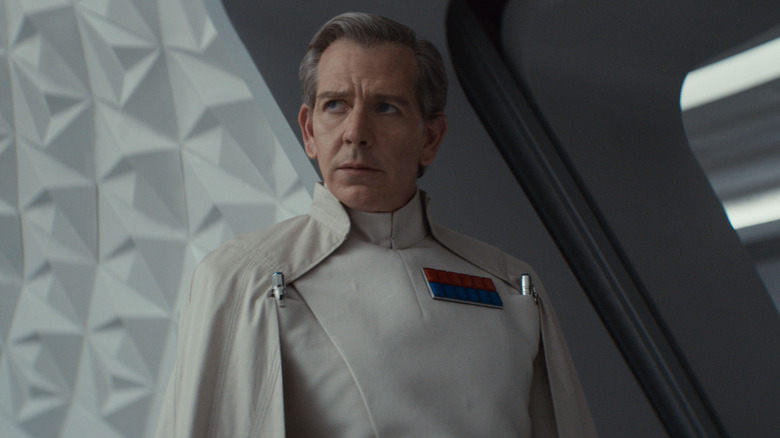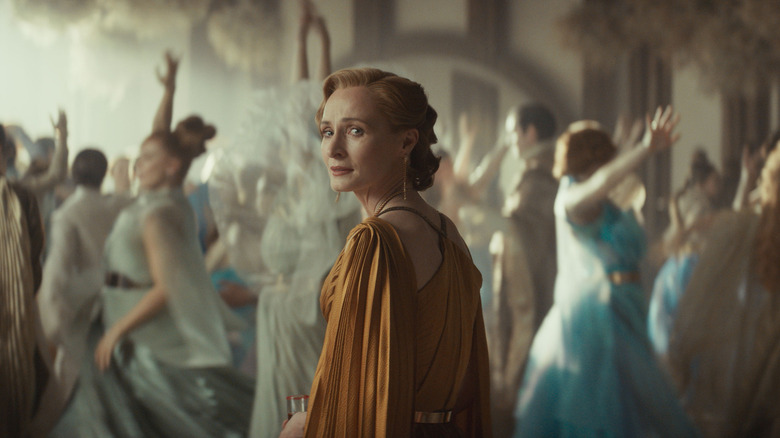Andor Season 2 Review: An Almost Flawless Conclusion To A Star Wars Masterpiece
- It looks amazing
- Stellar cast
- The story keeps you on edge
- The plot bounces around a lot, sometimes risking slowing things down too much
It's been more than two years since "Andor" premiered and became arguably the most acclaimed piece of "Star Wars" lore to arrive in the Disney era. The prequel to the events of "Rogue One: A Star Wars Story," shepherded by that film's co-writer Tony Gilroy, has been praised as a mature, complex, and addictive blend of spy-thriller and rebellion drama. It offers our most complete picture yet of the insidious power of the Empire, and the Rebellion which rose up to stop it.
In the two-and-half years since "Andor" ended its first season, the show has only grown in esteem, casting a long shadow over every "Star Wars" effort that's arrived since. Add to that Gilroy's promise that the second season would be the last, and would cover an ambitious four-year stretch of galactic history, and you've got a recipe for a can't-miss show. The only question that remained was how "Andor" would answer all of that hype.
Now we know. Over the course of 12 epic episodes covering everything from hyper-specific local skirmishes to galaxy-wide schemes that prime the "Star Wars" universe for war, "Andor" proves that its first season was no fluke, and that it still has what it takes to be considered one of the best "Star Wars" stories ever.
We pick up one year later
Tony Gilroy's overall storytelling scheme for the second season of "Andor," which will set up both the individual and galactic stakes for the events of "Rogue One: A Star Wars Story" and by extension "Star Wars: A New Hope," involves what's basically a four-act structure. There are 12 episodes (all of which were offered to press prior to the season premiere), and every three episodes cover a year of the struggle between the bureaucratic might of the Galactic Empire and the scrappy determination of the Rebel Alliance.
To say more about those later time jumps would be to compromise some of the bigger reveals Gilroy and company are hoping to land, but the season begins one year after the explosive funeral on Ferrix (read this if you need a recap before watching "Andor" Season 2). Cassian Andor (Diego Luna) has grown from directionless fighter to seasoned operative under his superior, the wily and brilliant Luthen Rael (Stellan Skarsgård) — and with Mon Mothma's (Genevieve O'Reilly) help in the Imperial Senate, Rebel intelligence has become more powerful than ever.
But with fresh power in intelligence-gathering comes new hurdles to clear, and new Imperial secrets to crack. As we pick the action back up, something big is brewing on one particular planet in the Empire's domain, something Director Orson Krennic (Ben Mendelsohn) says goes all the way up to the Emperor. The audience gets wind of what's up fairly quickly, but for Cassian and his allies, this is the start of a bigger mystery, a new powder keg about to catch fire in the galaxy. If they play it right, they have a fighting chance. If they don't, Imperial oppression will reach entirely new levels of pain for all of them.
This is just scratching the surface of what "Andor" has to offer. Like the first season, the second is focused on the macro as well as the micro, giving us intimate stories of Cassian, his friend and lover Bix Caleen (Adria Arjona), his sometime spy colleague Vel Sartha (Faye Marsay), and more. And on the Imperial side of things we learn more about Syril Karn (Kyle Soller), Dedra Meero (Denise Gough), and the rest of the intelligence bureau as they work not just to quell the Rebellion, but to work the Emperor's will on a frightened, often ill-informed populace. It's a lot to take in, and that's just in the opening episodes. It's what "Andor" does with all of this information, though, that really counts.
A vast conflict, driven by heart
From the beginning, the sheer scale of "Andor" has not been lost on its cast, writers, crew, or viewers. This is a planet-hopping, plot-packed, character-laden whirlwind of a story, but as with the first season, it's the little things that get you first. Never before has the lived-in aesthetic that so helped early "Star Wars" stories attain verisimilitude achieved so much in such a far-reaching way. "Andor" will tell you how these characters eat, cook, and even commute to work — and it will do it all while keeping the plot moving and delicately shading in the lives of its huge ensemble cast. It's a deeply, fascinatingly immersive show, and every episode there's something — like Syril's bowl of what looked like cereal in the first season — that keeps you looking deeper. When we talk about things that "feel" like they're "Star Wars," that's a big part of it, and "Andor" exudes it through its entire production design.
The same feeling of crackling, seasoned life that looms in each of the show's many stunning sets is also still very evident in its cast. Diego Luna, still the natural leader of the group as the title character, finds new depths in Cassian, things he can convey with a look in those deep, sad eyes, or a simple gesture in the middle of an action sequence. He's a character who's growing and changing, and while we know where he started and where he ends up, the middle ground is much more complicated, far from a straight psychological and emotional line. Luna is able to not just play that mystery, but make us believe it deeply, the same way we believe his love for Bix or his arm's length respect for Luthen. As for the ensemble around Luna, everyone is still operating at the top of their game, particularly Stellan Skarsgård and Genevieve O'Reilly, who make the most of the show's many time jumps and location hops to really stretch out their characters and bring them just as much detail as Luna.
Above all, though, the most thrilling and impressive element of "Andor" Season 2 is its writing. With Tony Gilroy at the helm of the whole series, the new season is broken up into three-episode blocks set in different time periods, with Gilroy himself scripting the first block, Beau Willmon the second, Dan Gilroy the third, and Tom Bissell the fourth and final. This divvying up of duties, which carries through to the directorial team as well, means that each writer can focus on telling a different leg of the overarching plot, which sees Cassian and the scattered Rebels coalesce into more of a true Alliance. It's a remarkable exercise in dividing and conquering, giving the viewer discreet and satisfying chapters of a larger story while also building something bigger with the season-long plot.
Throughout its original run, "Andor" was praised for its complexity and maturity, its ability to project a grown-up feeling in "Star Wars" without ever resorting to grimdark cliches. All of that is still here and arguably even better in the second season, but what makes these 12 episodes truly shine isn't just the plotting, or the dialogue, or the careful way the show balances "Star Wars" action with an honest attempt to do something new in this world. No, what makes "Andor" Season 2 so very special is the emotional payoff it brings to bear on all that hype. This is, just as it was before, a show about tired, desperate, frightened people just trying to hold on to something worth saving, and while the cloak-and-dagger thrills of the show never leave us, it's that feeling that persists the longest, keeps us hanging onto every scene. This show, steeped in authoritarian tactics and darkness, could not have returned at a better time, and yet "Andor" does not preach to us, does not talk down, does not resort to easy black-and-white morality. It's earnest, honest almost to a fault, and determined to remain true to these fighters, these people who refuse to quit, who can tell us something powerful about the world we're in now. For those reasons, and many others, it's the best "Star Wars" series by far, a triumph for Lucasfilm, and a masterwork within one of genre's most venerated franchises.
"Andor" Season 2 premieres April 22 on Disney+.


